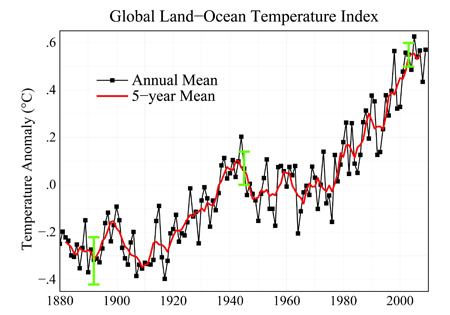We're two days away from President Obama's first State of the Union address. I personally wait with bated breath. The President threw some punches last week at the big banks on financial reform. Will he do the same on climate?
It's widely agreed that much of his speech will be either a defensive play after last week's Massachusetts election, or a proactive one, repositioning in anticipation of losing the Democratic supermajority in the Senate when Brown takes office. What is unclear to many is the extent to which the election of a conservative republican to the senate will have an effect on global climate change. Let me say that this Massachusetts shot has been heard 'round the world, and it hasn't been well received.
First, some new stats. According to NASA's Goddard Institute for Space Studies the first decade of the 21st Century was the hottest on record. 2009 virtually tied 6 other years (all since 1998) for the second warmest year since records began in 1880. So for one thing, it's still hot out there, and the heat is on.

(Image credit: NASA/GISS)
In the face of these ever-rising temperatures, the countries most affected by climate change made direct pleas at the Copenhagen UNFCCC conference last month. Among these was an impassioned statement by Ian Fry, a delegate from the sinking island nation of Tuvalu. As the world's climate negotiators worked to frame the debate in the first week, Fry stated:
It's an irony of the modern world that the fate of the world is being determined by some Senators in the US Congress.
Irony indeed. The United States responded to a beseeching world by brokering the Copenhagen Accord - behind closed doors and among a small set of countries, including India and China. No doubt, in the State of the Union, the President would have evoked the success of this agreement. The Accord is a three-page, non-binding document with a signature page where countries ink their commitments to emissions reductions - risk free. It's kind of like answering a pledge drive to save the planet - but in this case, when six months later you haven't honored the pledge, no one will phone you during dinner to persuade you to write the check. The signature due date is January 31, 2010. So who's signing the Accord? Not even its brokers.
The Indian newspaper The Hindu, reports that:
India and China have had a rethink on signing...and the UN has also indefinitely postponed its January 31 deadline.
The article goes on to quote an Indian official who admits that India was to sign the accord because it was safe to do so - it had no legal teeth and would be regarded as a good diplomatic move. The official also says that according to a UN official, the defeat of the Democrats in Massachusetts has contributed to the postponement. The Indian official notes:
So if the US is not going to reduce its greenhouse gas emissions by 17 percent, which was a very weak target anyway, why should we make any commitment even if it does not have any legal teeth?
Of the major developed countries, only Australia and Canada have signed. But they have done so without making any commitment of emissions reductions, a prerequisite of signing the accord. And with a US climate bill in jeopardy, why would they?
On April 19th, 1775, in Lexington Massachusetts, American rebels pulled a trigger that fired the "shot heard 'round the world" - starting a long war of independence from British tyranny. On January 19th, 2010, Massachusetts' voters pulled a trigger of their own, electing Scott Brown to the senate and shifting the political chessboard. In doing so, they fired a shot that was heard loud and clear the world over - the prospects for meaningful climate policy in the US are looking bleaker than ever, and from the perspective of the nations like Tuvalu, struggling with the effects of climate change, climate tyranny marches on. King takes pawn.